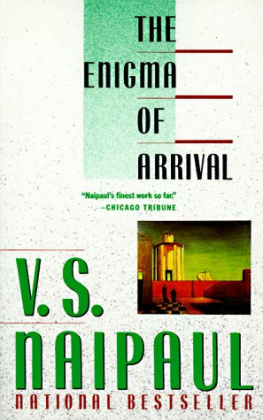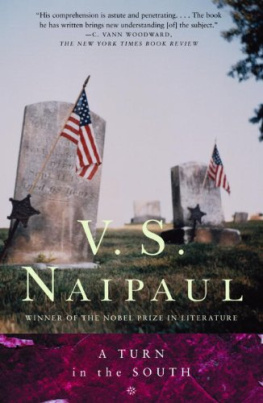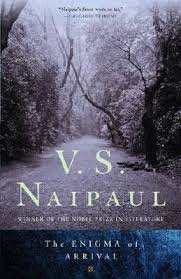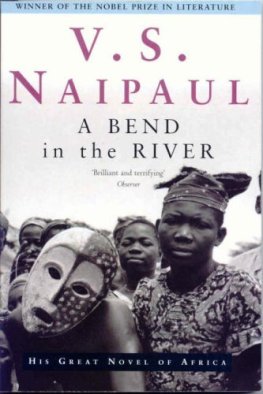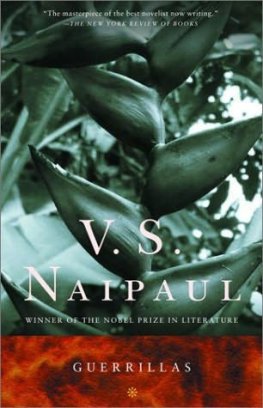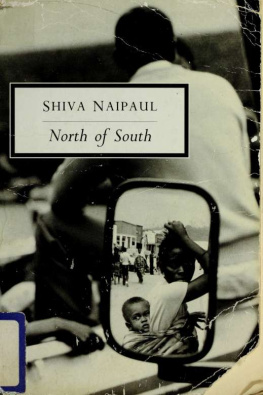V.S. Naipaul - The Enigma of Arrival
Here you can read online V.S. Naipaul - The Enigma of Arrival full text of the book (entire story) in english for free. Download pdf and epub, get meaning, cover and reviews about this ebook. year: 1988, publisher: Vintage, genre: Detective and thriller. Description of the work, (preface) as well as reviews are available. Best literature library LitArk.com created for fans of good reading and offers a wide selection of genres:
Romance novel
Science fiction
Adventure
Detective
Science
History
Home and family
Prose
Art
Politics
Computer
Non-fiction
Religion
Business
Children
Humor
Choose a favorite category and find really read worthwhile books. Enjoy immersion in the world of imagination, feel the emotions of the characters or learn something new for yourself, make an fascinating discovery.
- Book:The Enigma of Arrival
- Author:
- Publisher:Vintage
- Genre:
- Year:1988
- Rating:5 / 5
- Favourites:Add to favourites
- Your mark:
- 100
- 1
- 2
- 3
- 4
- 5
The Enigma of Arrival: summary, description and annotation
We offer to read an annotation, description, summary or preface (depends on what the author of the book "The Enigma of Arrival" wrote himself). If you haven't found the necessary information about the book — write in the comments, we will try to find it.
The Enigma of Arrival — read online for free the complete book (whole text) full work
Below is the text of the book, divided by pages. System saving the place of the last page read, allows you to conveniently read the book "The Enigma of Arrival" online for free, without having to search again every time where you left off. Put a bookmark, and you can go to the page where you finished reading at any time.
Font size:
Interval:
Bookmark:
THE ENIGMA OF ARRIVAL
V. S. Naipaul
IN LOVING MEMORY
OF MY BROTHER
SHIVA NAIPAUL
25 FEBRUARY 1945, PORT OF SPAIN
13 AUGUST 1985, LONDON
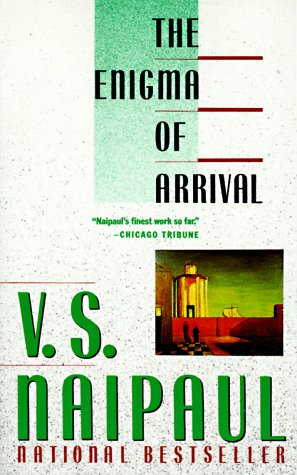
F OR THE first four days it rained. I could hardly see where I was. Then it stopped raining and beyond the lawn and outbuildings in front of my cottage I saw fields with stripped trees on the boundaries of each field; and far away, depending on the light, glints of a little river, glints which sometimes appeared, oddly, to be above the level of the land.
The river was called the Avon; not the one connected with Shakespeare. Laterwhen the land had more meaning, when it had absorbed more of my life than the tropical street where I had grown upI was able to think of the flat wet fields with the ditches as water meadows or wet meadows, and the low smooth hills in the background, beyond the river, as downs. But just then, after the rain, all that I sawthough I had been living in England for twenty yearswere flat fields and a narrow river.
It was winter. This idea of winter and snow had always excited me; but in England the word had lost some of its romance for me, because the winters I had found in England had seldom been as extreme as I had imagined they would be when I was far away in my tropical island. I had experienced severe weather in other placesin Spain in January, in a skiing resort near Madrid; in India, in Simla in December, and in the high Himalayas in August. But in England this kind of weather hardly seemed to come. In England I wore the same kind of clothes all through the year; seldom wore a pullover; hardly needed an overcoat.
And though I knew that summers were sunny and that in winter the trees went bare and brushlike, as in the watercolors of Rowland Hilder, the yearso far as vegetation and even temperature wentwas a blur to me. It was hard for me to distinguish one section or season from the other; I didnt associate flowers or the foliage of trees with any particular month. And yet I liked to look; I noticed everything, and could be moved by the beauty of trees and flowers and early sunny mornings and late light evenings. Winter was to me a time mainly of short days, and of electric lights everywhere at working hours; also a time when snow was a possibility.
If I say it was winter when I arrived at that house in the river valley, it is because I remember the mist, the four days of rain and mist that hid my surroundings from me and answered my anxiety at the time, anxiety about my work and this move to a new place, yet another of the many moves I had made in England.
It was winter, too, because I was worried about the cost of heating. In the cottage there was only electricitymore expensive than gas or oil. And the cottage was hard to heat. It was long and narrow; it was not far from the water meadows and the river; and the concrete floor was just a foot or so above the ground.
And then one afternoon it began to snow. Snow dusted the lawn in front of my cottage; dusted the bare branches of the trees; outlined disregarded things, outlined the empty, old-looking buildings around the lawn that I hadnt yet paid attention to or fully taken in; so that piece by piece, while I considered the falling snow, a rough picture of my setting built up around me.
Rabbits came out to play on the snow, or to feed. A mother rabbit, hunched, with three or four of her young. They were a different, dirty color on the snow. And this picture of the rabbits, or more particularly their new color, calls up or creates the other details of the winters day: the late-afternoon snow light; the strange, empty houses around the lawn becoming white and distinct and more important. It also calls up the memory of the forest I thought I saw behind the whitening hedge against which the rabbits fed. The white lawn; the empty houses around it; the hedge to one side of the lawn, the gap in the hedge, a path; the forest beyond. I saw a forest. But it wasnt a forest really; it was only the old orchard at the back of the big house in whose grounds my cottage was.
I saw what I saw very clearly. But I didnt know what I was looking at. I had nothing to fit it into. I was still in a kind of limbo. There were certain things I knew, though. I knew the name of the town I had come to by the train. It was Salisbury. It was almost the first English town I had got to know, the first I had been given some idea of, from the reproduction of the Constable painting of Salisbury Cathedral in my third-standard reader. Far away in my tropical island, before I was ten. A four-color reproduction which I had thought the most beautiful picture I had ever seen. I knew that the house I had come to was in one of the river valleys near Salisbury.
Apart from the romance of the Constable reproduction, the knowledge I brought to my setting was linguistic. I knew that avon originally meant only river, just as hound originally just meant a dog, any kind of dog. And I knew that both elements of Waldenshawthe name of the village and the manor in whose grounds I wasI knew that both walden and shaw meant wood. One further reason why, apart from the fairy-tale feel of the snow and the rabbits, I thought I saw a forest.
I also knew that the house was near Stonehenge. I knew there was a walk which took one near the stone circle; I knew that somewhere high up on this walk there was a viewing point. And when the rain stopped and the mist lifted, after those first four days, I went out one afternoon, looking for the walk and the view.
There was no village to speak of. I was glad of that. I would have been nervous to meet people. After all my time in England I still had that nervousness in a new place, that rawness of response, still felt myself to be in the other mans country, felt my strangeness, my solitude. And every excursion into a new part of the countrywhat for others might have been an adventurewas for me like a tearing at an old scab.
The narrow public road ran beside the dark, yew-screened grounds of the manor. Just beyond the road and the wire fence and the roadside scrub the down sloped sharply upwards. Stonehenge and the walk lay in that direction. There would have been a lane or path leading off the public road. To find that lane or path, was I to turn left or right? There was no problem, really. You came to a lane if you turned left; you came to another lane if you turned right. Those two lanes met at Jacks cottage, or the old farmyard where Jacks cottage was, in the valley over the hill.
Two ways to the cottage. Different ways: one was very old, and one was new. The old way was longer, flatter; it followed an old, wide, winding riverbed; it would have been used by carts in the old days. The new waymeant for machineswas steeper, up the hill and then directly down again.
You came to the old way if you turned left on the public road. This stretch of road was overhung by beeches. It ran on a ledge in the down just above the river; and then it dropped almost to the level of the river. A little settlement here, just a few houses. I noticed: a small old house of brick and flint with a fine portico; and, on the riverbank, very close to the water, a low, white-walled thatched cottage that was being done up. (Years later that cottage was still being done up; half-used sacks of cement were still to be seen through the dusty windows.) Here, in this settlement, you turned off into the old way to Jacks cottage.
An asphalt lane led past half a dozen ordinary little houses, two or three of which carriedtheir only fanciful touchthe elaborate monogram of the owner or builder or designer, with the date, which was, surprisingly, a date from the war: 1944. The asphalt gave out, the narrow lane became rocky; then, entering a valley, became wide, with many flinty wheeled ruts separated by uneven strips of coarse, tufted grass. This valley felt old. To the left the steep slope shut out a further view. This slope was bare, without trees or scrub; below its smooth, thin covering of grass could be seen lines and stripes, like weals, suggesting many consecutive years of tilling a long time ago; suggesting also fortifications. The wide way twisted; the wide valley (possibly an ancient river course) which the way occupied then ran straight and far, bounded in the distance by the beginning of a low down. Jacks cottage and the farmyard were at the end of that straight way, where the way turned.
Next pageFont size:
Interval:
Bookmark:
Similar books «The Enigma of Arrival»
Look at similar books to The Enigma of Arrival. We have selected literature similar in name and meaning in the hope of providing readers with more options to find new, interesting, not yet read works.
Discussion, reviews of the book The Enigma of Arrival and just readers' own opinions. Leave your comments, write what you think about the work, its meaning or the main characters. Specify what exactly you liked and what you didn't like, and why you think so.

